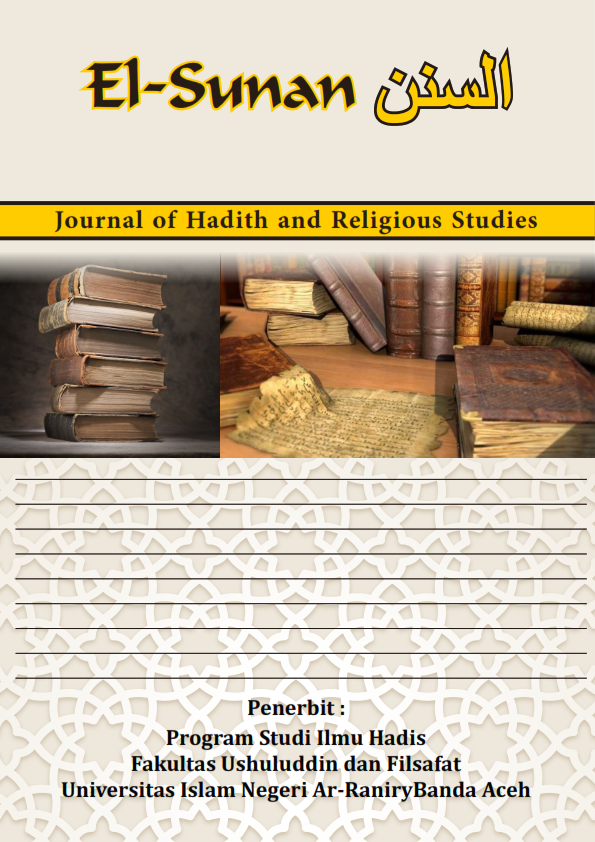Studi terhadap Polemik antara Larangan dan Pembolehan Penulisan Hadis
DOI:
https://doi.org/10.22373/el-sunan.v1i1.3455Keywords:
Hadith, Prohibition, AllowancAbstract
Hadith, which is the second source of Islamic law, apart from functioning to explain the Qur'an, also serves to reinforce the laws of the Koran and serves to establish laws that are not found in the Koran. There are two contradictory hadiths related to the writing of hadith: the hadith which prohibits and the hadith which encourages the writing of hadith. The orders to pray, pay zakat, and perform Hajj are only mentioned in general. The Qur'an does not explain the number of cycles and the ways of performing the prayers, does not specify the nisabs of zakat, and also does not explain the ways of performing the pilgrimage. But all of that has been explained in detail and interpreted as broadly as possible by hadith. This research is a study that uses the literature review method which aims to discuss the polemic between the prohibition and permissibility of the use of hadith. Seeing the importance of the position of the hadith, this paper wants to discuss the condition of the hadith at the time of the Prophet and his companions, which is the most important phase of the history of hadith. This discussion includes the understanding of hadith and sunnah, how friends receive hadith from the Prophet, discussions about the prohibitions and recommendations for writing hadith, and the attitude of friends towards the transmission of hadith. The books used are the opinions of previous scholars and authors, and the journals used are sourced from updated journals.
References
Al-Khathib al-Baghdadi. t.th. al-Jâmi’ li Akhlâq al-Râwî wa Âdâb al-Sâmi’, Makhthûth al-Iskandariyah.
Annibras, Nablur Rahman. "Larangan tasyabbuh dalam perspektif hadist." Tajdid: Jurnal Pemikiran Keislaman dan Kemanusiaan 1.1 (2017): 75-96.
Harahap, Radinal Mukhtar. "Hadis Pada Masa Nabi Muhammad Saw Dan Sahabat." Al-Bukhari: Jurnal Ilmu Hadis 1.1 (2018): 37-51.
Iskandar, Muhammad. "Periodesasi Penulisan Hadis Nabi Saw." DIRAYAH: Jurnal Ilmu Hadis 1.1 (2020): 52-67.
Jamaluddin, Syakir. "Tadwin Al-Hadits: Kontroversi Sekitar Autentisitas Hadis Larangan Penulisan Hadis." Tarjih: Jurnal Tarjih dan Pengembangan Pemikiran Islam 7.1 (2004): 117-134.
Muhammad ‘Ajjaj al-Khatib, Al-Sunnat Qabl al-Tadwîn, Dâr al-Fikr, (1971), Cet. II, Beirut.
Muhammad al-Shabbagh, Al-Hadîts al-Nabawî, al-Maktab al-Islâmî, (1971), Riyadh.
Shubhi Shalih, `Ulum al-Hadîts, Dâr al`Ilm Li al-Malâyîn, Cet. IX. (1977).
Usman, Iskandar, Hadis pada Masa Rasulullah dan Sahabat: Studi Kritis terhadap Pemeliharaan Hadis, El-Usrah: Jurnal Hukum Keluarga 4.1 (2021): 47-63.
Yunitasari, Riska. "MASA KODIFIKASI HADIS Meneropong Perkembangan Ilmu Hadis Pada Masa Pra-Kodifikasi hingga Pasca Kodifikasi." Jurnal Ilmiah Ar-Risalah: Media Ke-Islaman, Pendidikan dan Hukum Islam 18.1 (2020): 101-113.
Downloads
Published
How to Cite
Issue
Section
License
- Authors retain copyright and grant the journal right of first publication with the work simultaneously licensed under an Attribution-NonCommercial-ShareAlike 4.0 International (CC BY-NC-SA 4.0) that allows others to share the work with an acknowledgment of the work's authorship and initial publication in this journal.
- Authors are able to enter into separate, additional contractual arrangements for the non-exclusive distribution of the journal's published version of the work (e.g., post it to an institutional repository or publish it in a book), with an acknowledgment of its initial publication in this journal.
- Authors are permitted and encouraged to post their work online (e.g., in institutional repositories or on their website) prior to and during the submission process, as it can lead to productive exchanges, as well as earlier and greater citation of published work.


